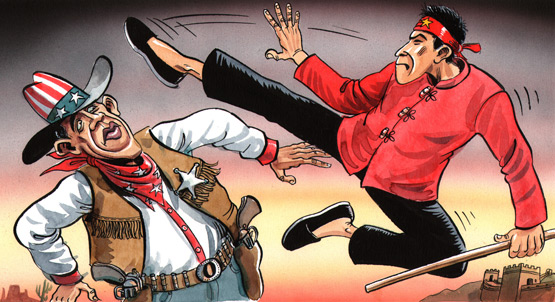The United States has continued its fight with China over China’s trade surplus and currency valuation, with little to show for its arguments in the past few months.
U.S.-South Korea military exercises near the coast of China have incensed Chinese officials, as did President Obama’s meeting with the exiled Tibetan spiritual leader the Dalai Lama and a U.S. arms sale to Taiwan, both of which happened earlier this year.

The president sent economic adviser Larry Summers to China, repeating a similar trip last March that made the U.S. look weak. Gordon G. Chang on how Obama’s making the same mistake twice.
National Economic Council Director Lawrence Summers and Deputy National Security Adviser Thomas Donilon arrived in Beijing yesterday to put relations with China back on track. Their visit is scheduled to end Wednesday.
At the top of Washington’s agenda are two items. First, there is Beijing’s predatory fixing of the value of the renminbi. China had raised hopes on June 19 when it announced it would increase exchange rate “flexibility.” Up until then, the Chinese central bank had pegged the value of the renminbi to the dollar. Since the widely welcomed change, the currency has appreciated less than 0.3% against the greenback, however. Many analysts believe the yuan, as the renminbi is informally known, is undervalued by as much as 40%. Beijing has, throughout the years, manipulated the value of its currency to boost exports.
Second, the American delegation is expected to raise the issue of China’s increasingly close economic relations with Iran. The concern is that Chinese enterprises and financial institutions will be “backfilling,” rushing in to take up commercial opportunities abandoned by companies and banks complying with international sanctions. Beijing voted for Security Council measures in June but has criticized Washington’s additional sanctions, which have been followed by the European Union, Canada, Australia, and Japan.
There are, of course, a host of other agenda items, from troubled military ties to Beijing’s claims to the South China Sea to China’s relations with North Korea. Chinese diplomats will undoubtedly raise the “T” issues, Taiwan, Tibet, and trade.
On Wednesday, we are sure to hear expressions of progress as the two sides wrap up discussions, but real forward movement seems unlikely. First, Beijing and Washington have irreconcilable goals. Chinese leaders recognize this and talk about the nature of their differences with us. American officials, on the other hand, still cannot bring themselves to have honest conversations, even in private.
Second, Washington seems intent on pursuing counterproductive tactics. In early November, for instance, Jeffrey Bader, the top Asia official on the National Security Council, publicly said no important issue in the world could be solved without China’s cooperation. In effect, Bader, now in Beijing as part of the Summers-Donilon delegation, gave the Chinese a veto over American foreign policy. So it should come as no surprise that they were especially uncooperative during President Obama’s November summit in Beijing.
Just weeks after that, the Chinese went on a bender, adopting obstructionist tactics at the Copenhagen climate change conference in December. China’s officials then made hostile comments—and specific threats—on matters ranging from minor arms sales to Taiwan to a literally back-door visit by the Dalai Lama to the White House.
So what did President Obama do? He sent two senior officials, Bader and Deputy Secretary of State James Steinberg, to Beijing in March. The Chinese saw the visit as a sign of weakness and said the pair had come to apologize to China, a theme echoed in official media. Of course, neither of the Americans made apologies to China, but Beijing was in no mood to talk to them in earnest.
In fact, Beijing during the Bader-Steinberg visit staked out even more aggressive positions. For instance, the Chinese for the first time labeled their ludicrous claims to the entire South China Sea as a “core interest” of their nation.
Obama’s good-hearted initiative had backfired, apparently encouraging the very behavior he sought to prevent. Yet what is the president doing now? He is sending even more officials to Beijing. The Chinese will see this as the Apology Tour, the Sequel. The White House is just not learning from its mistakes.
Now would be a good time for the Obama administration to change course. House Ways and Means Committee Chairman Sander Levin will begin hearings on China’s exchange rate on September 15. The early betting is that he will report out the Tim Ryan bill, and House Speaker Nancy Pelosi has made it clear she wants legislation soon. In the Senate, Chuck Schumer’s legislative proposals have attracted bipartisan support with as perhaps as many as 70 of his colleagues on his side.
Beijing needs to be concerned that a weakened Obama will be in no position to veto legislation targeting the renminbi. China is increasing its dependence on the American market—last year 115.7% of its overall trade surplus related to sales to us, up from 90.1% in 2008. Currency legislation, in short, could add to the woes of the weakening Chinese economy.
And on Iran, it seems much of the international community is lining up behind U.S. sanctions. Reports that the “atomic ayatollahs” are close to weaponizing their uranium is, naturally, drawing the world against the Islamic Republic. Iran and its allies—Beijing is now Tehran’s primary backer—look like they might get run over by the global momentum.
So, at this moment the Chinese have many more reasons to come talk to us than we have to go see them.